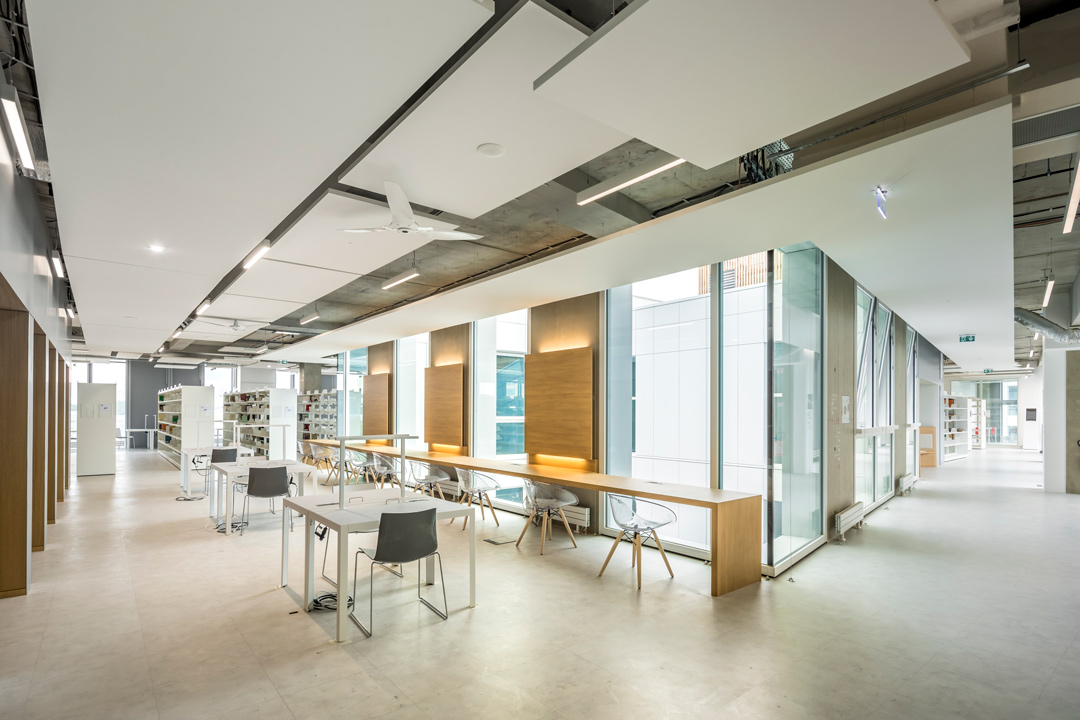A library dedicated to research
In the same section
Now accessible to all members of the public who wish to come and work here and explore its unparalleled resources in the social sciences and humanities, the Humathèque Condorcet is home to documentation and archive materials, and has been designed as a research laboratory in close collaboration with the Campus Condorcet research teams. Welcome to a space given over to experimentation and innovation, where scientific synergy is fostered.

DOCUMENTATION COLLECTIONS
The Humathèque’s collections comprise an incredible wealth of printed documentation (one million documents in total) published in multiple languages and sourced from over 50 libraries, documentary collections and archive departments. This cross-disciplinary resource is organised in a series of unique specialist collections and divided into eight research sections. The vast majority of documents are self-service and can be borrowed (conditions apply).
The eight research sections:
- Knowledge and Expertise
- History
- Texts, Meaning and Creation
- Spaces, Populations and Societies
- Africa
- The Americas
- Asia
- Eurasia
EXPLORE THE RESEARCH ARCHIVES COLLECTIONS
The Humanities Library is home to archives sourced from nine social sciences and humanities research bodies, collated and accessible at a single location at the Aubervilliers site.
This scientific heritage archive is made up of archive material from the research centres and their researchers, and archives collected by these centres and researchers from other sources (learned societies, activists, civil servants, contemporary history eye-witness accounts).
This major archival ensemble sheds light onto how disciplines evolve, the emergence of new fields and areas of research, intellectual networks, and how researchers relate to their field of inquiry. More broadly, it also explores research and higher education teaching conditions, the role of scientific publishing, and the relationship between science and media.
DELVE INTO THE ARCHIVES OF AN INCREDIBLE BUILDING
Designed by architect Elizabeth de Portzamparc and funded by the Île-de-France Region, the Humathèque’s 23,000 m2 offer spaces in which to study and reflect in a range of atmospheres and rooms tailored to researchers’ and students’ diverse ways of working.
The building and its facilities have been configured to foster exchange and seamless interaction between collection and archive materials: shared reading spaces, pooled professional skill-sets and training for archivists, research clerks and librarians, shared research interfaces, and more.
Find out moreCULTURE AND SCIENCE ON THE PROGRAMME
Home to a forum, an auditorium and an exhibition hall, the ground floor is a space where all are welcome to come and engage in open, accessible events.
Designed hand in hand with researchers with a diverse audience in mind, the Humathèque’s line-up of cultural and scientific activities is inspired by the collections, the Campus Condorcet’s fields of research, and the particularities of the site’s location.
This line-up is packed full of talks, conferences, screenings, debates, workshops, exhibitions and more, with all the very latest from the world of research made accessible through regular fixtures such as discussion about scientific literature and “Film Thursdays”.
Events at the humanities libraryThe Humathèque in figures
- €110M in construction fully funded by the Région Île-de-France
- 23,000 m2 of reading, learning and knowledge-sharing space spread over five floors, two of which are set aside for professionals
- 1,400 seats and over 40 study rooms to seat four to 30 people
- Open Monday to Friday from 10.00 a.m. to 7.00 p.m.
- 50 libraries, documentation centres and archive departments brought together in one place
- One million documents available, with over 80% self-service
- 5 km of archive material taken from social sciences and humanities research
- Eight research sections
Practical informations
Contact the GED
Address
10, cours des Humanités,
93322 Aubervilliers
Opening hours
Monday to Friday 10:00 a.m. to 7:00 p.m.